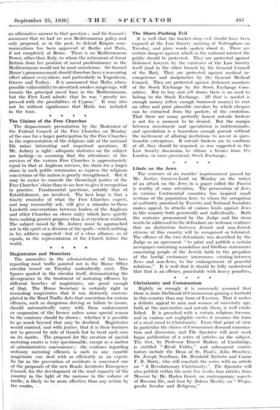Magistrates and Motorists The anomalies in the administration of the
laws regarding road traffic pointed out in the Home Office circular issued on Tuesday undoubtedly exist. The figures quoted in the circular itself, demonstrating the divergencies in the treatment of motoring offences by different benches of magistrates, are proof enough of that. The Home Secretary is certainly right in reminding magistrates that it was distinctly contem- plated in the Road Traffic Acts that conviction for certain offences, such as dangerous driving or failure to insure, Should automatically carry with them endorsement or suspension of the licence unless some special reason to the contrary should be shown ; whether it is possible to go much beyond that may be doubted. Magistrates would contend, and with justice, that it is their business not to proceed by rule of thunib but to treat each case on its merits. The proposal for the creation of special motoring courts is- very -questionable, except as a matter of administrative convenience ; the evidence- regarding ordinary motoring offences is such as any capable magistrate can deal with as efficiently as an expert. So far as the prevention of accidents is concerned one of the proposals of the new Roads Accidents Emergency Council, for the development of the road capacity of the country in the light of the increase in the volume of traffic, is likely to be more effective than' any action by the courts. '


















































 Previous page
Previous page